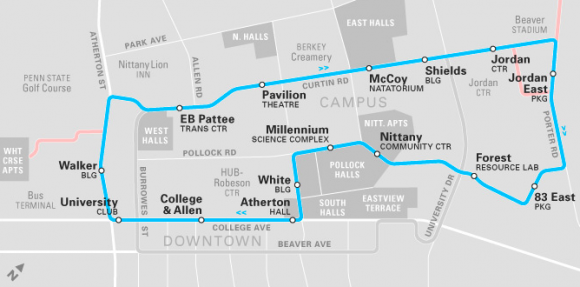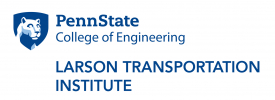As Penn State continues to grow, the pressure is on for Transportation Services to accommodate transportation and parking for students, staff, and visitors. The University is working to sustainably manage its growing transportation demands by switching to alternative fuels, reducing oil consumption, increasing the fuel efficiency of and electrifying fleet vehicles, and encouraging the use of public transportation.
Supporting Walkers & Bikers!
Penn State’s University Park campus strives to be both pedestrian and bicyclist friendly. The University recently collaborated with the Borough of State College to develop a Bicycle Master Plan that will promote bicycle commuting and expand on-campus mobility for students and staff. Be sure to register your bike and use the Centre Region Parks and Recreation Parks and Bikeways map to plan your next commute!
Eco-Friendly Fleet Vehicles
Many of University Park’s passenger and utility fleet vehicles operate on bio-diesel fuel, which helps reduce Penn State’s overall greenhouse gas emissions. According to the Environmental Protection Agency, biodiesel from soy oil results in an average emissions reduction of 57% when compared to traditional petroleum diesel. The Office of Physical Plant alone operates more than 130 bio-diesel vehicles, along with a host of electric vans, trucks, and segways. Efforts are underway to further reduce the environmental impact of Penn State vehicles through improvements in both fuel efficiency and fleet composition.
Partnership with CATA & Fullington
Penn State has partnered with the Centre Area Transit Authority (CATA) to offer cost-effective alternative transportation solutions for students and staff.
- CATA operates free on-campus shuttle buses for students and employees. The Blue Loop, White Loop, and Red Link routes are fare-free seven days a week. Download the CATA iPhone App to track live arrival and departure times.
- CATA’s RIDEpass program provides access to all CATABUS routes to eligible University Park graduate students for only $15 per month. Transportation Services covers the remaining cost of each graduate student mass transit pass to encourage the use of mass transit, reduce vehicle congestion on campus, and promote sustainable transportation.
- CATA’s Rideshare program encourages carpooling among employees who live near one another. For groups of 7 to 12 people living in the same area, CATA offers a Vanpool Program.
- Most buses servicing Centre County use compressed natural gas, which produces fewer emissions than gasoline.
- Using subsidies from Penn State Transportation Services, Fullington Trailways now offers low-cost express bus service to New York City, New Jersey, and Washington, D.C. Visit Fullington’s website to view itineraries and purchase tickets.
CATA’s “Blue Loop” Service Map:

The Larson Institute
The Thomas D. Larson Pennsylvania Transportation Institute is Penn State’s transportation research center — a major, multidisciplinary unit within the Department of Civil and Environmental Engineering. Since its inception in 1968, the Larson Transportation Institute has maintained a threefold mission of research, education, and service. It is the locus for transportation-related research conducted by Penn State faculty from more than 14 colleges and research centers, with areas of specialization ranging from civil, computer, electrical, architectural, industrial, and mechanical engineering to agriculture, information sciences and technology, supply chain management, economics, geography, psychology, and statistics. The institute provides a unique focal point of collaboration for expert faculty and enterprising students from across the University together with public and private stakeholders to address critical transportation-related needs of the individual user and the world at large.
In an effort to reduce air pollution caused by large diesel trucks and large vehicles, Penn State follows the Pennsylvania Department of Environmental Protection’s Diesel-Powered Motor Vehicle Idling Act (Act 124). The act reduces unnecessary idling of the main propulsion engine in diesel-powered motor vehicles, including trucks and buses, by imposing time limits while engaged in commerce. Act 124 restricts diesel idling to 5 minutes in any continuous 60-minute time period for diesel-powered vehicles with a gross weight of 10,001 pounds or more engaged in commerce. There are exemptions allowed.



